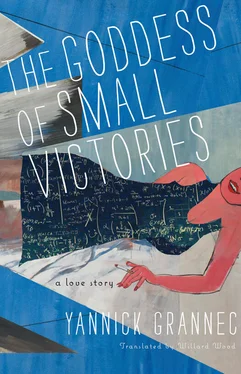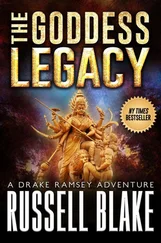“You’re right, Adele, no one should be deified. All the same, I worry about the confusion in the mind of the general public. Poorly digested scientific terminology is the new Latin liturgy. Any harebrained thought formulated in pseudoscientific language sounds like the truth. It’s so easy to manipulate the crowd by giving them false facts.”
He angrily crumpled his paper.
“The times are growing darker. This Truman doesn’t come up to Roosevelt’s ankle.”
“I don’t see how my theorems could enter popular culture. They derive from a logical language that is much too difficult for the layman.”
“The recipe couldn’t be easier. A pinch of shortcut. A dash of bad faith. Does the universe contain undecidable propositions? Yes! Consequently, the universe cannot conceive of itself. Hence, God exists.”
“Can Kurt Gödel conceive of himself? No! His wife has to remind him when it is lunchtime. Consequently, Kurt Gödel is not God.”
My husband stuck his fingers in his ears. “I’m not listening to you two anymore! You’re talking absolute nonsense!”
At the corner of Maxwell Lane, a brand-new sky-blue Ford slowed down alongside us. The driver, a sweet-faced woman in her forties, waved hello at Professor Einstein and offered to give him a lift.
“I prefer to walk, darling Lili. You know that very well. Allow me to introduce you to Adele and Kurt Gödel.”
She gave us a friendly smile.
“Alice Kahler-Loewy, but my friends call me Lili. Mrs. Gödel, you’re Viennese, aren’t you? It would be such pleasure if you would join us one night for dinner. I’m going to say a word or two to Erich. See you soon!”
She took off with a squeal of tires. Her charm, so free of affectation, had won me over. Albert regretfully watched the car drive off.
“Lili is a very good friend of Margot and the wife of Erich von Kahler. Do you know him, Gödel?”
“He is a philosopher and a historian. I’ve met him at the Institute.”
“You would get along with her very well, Adele, I’m sure of it. Our families have known each other for ages. Their house on Evelyn Place is an intellectual oasis that is astonishing even for Princeton. They are very good friends with Hermann Broch.” 22
“Von Kahler? They’re upper-crust. I don’t feel comfortable in that crowd.”
“It’s true that I never see you at the receptions for Germanophiles. But in fact it’s one of the great pleasures of Princeton. Thomas Mann gave a wonderful lecture only last week. And Lili is not in the least snobbish. She finds my jokes funny, to give you an idea!”
I was skeptical but decided to keep it to myself. Herr Einstein’s golden aura allowed him to ignore social differences, but it was another story for me. Money wasn’t the only disparity. There was also culture, and the divide was one I couldn’t cross. Lili, as I learned later, was the daughter of a great Austrian art collector. The Nazis had stripped her father of his assets in return for letting his family go, but he was unable to emigrate in time. Her husband, Erich, had barely escaped from the Gestapo himself. He had lost his house, his fortune, and his German citizenship. His books were on Hitler’s blacklist, along with Albert’s and those of his close friend Zweig, who had not survived. 23
Although I read very little, I had heard of Thomas Mann and his Magic Mountain . Why would I saddle myself with a thousand-page novel set in a sanatorium? I had my own experience of it already. I couldn’t count on Kurt to raise my cultural literacy: his own tastes in art were as uninformed as mine. He disliked Goethe and found Shakespeare difficult to fathom. He enjoyed light music and short books. Wagner made him nervous; Bach anguished him; he preferred popular songs to Mozart. His choice of entertainment, like his choice of food, tended toward the flavorless. No one could suspect him of intellectual laziness, but when anyone accused him of a reverse snobbism toward art, as Einstein sometimes did, he would answer: “Why should good music be dramatic or good literature long-winded?” This was the advantage of being a genius. My own simple tastes, on the other hand, passed for a scandalous lack of education. My husband’s lack of interest in society, while it kept me from making friends, at least spared me from humiliation.
“I have never managed to finish The Magic Mountain . It’s so boring! I like succinctness. The longer a work is, the less substance it has.”
“Gödel, the more I know about you, the less I understand.”
“I am extremely sensitive to every form of stimulus. My energy is limited, and I save it for my work. When I’m not working, I avoid tiring my senses. I hate comedies, and dramatic works exhaust me.”
“You’re like a violin that is too tightly strung, old friend. Your music is delightful, but there’s a danger that you’re going to break a string at any moment. Give yourself a little slack!”
“You would find me less interesting if I were more like you, Herr Einstein.”
“You are right. Our walks are the high point of my day. No one dares to contradict me anymore except you. It’s so tiresome.”
I could see my man swell with pride. Albert knew how to handle him. He liked to dole out abrupt contradictions and subtle flatteries to quiet Kurt’s anxious nature, but in this instance he was being sincere: walking was one of their few shared tastes. For both friends, it functioned as a sort of philosophical gymnastics. One day when I’d made fun of their little after-dinner walks, my husband subjected me to a long history lesson. His illustrious predecessor Aristotle had founded the Peripatetic school, where teachers and students debated while they walked, because there is nothing like an ambulatory exchange of ideas to get an argument unstuck. By following this method, Kurt hoped to go beyond the traveled paths of thought. As if I hadn’t always encouraged him to see people! Without having studied a great deal, I knew one thing to be true: you exist only through others. But I never understood how he expected to break free of his habits by always taking the same path. I wasn’t a philosopher, I suppose.
“Kurt hates being wrong. With you, he has an uphill battle.”
“Contradiction, like digression, is a precious stimulant. Thinking has to be a movement, unstable, like life itself. If it stops, it hardens and dies.”
“Kurt is such a stay-at-home. He doesn’t allow for any fantasy.”
“He walks as a logician does, one street after another. Nietzsche climbed mountains. He wanted to measure himself against the extremes.”
“And his philosophy is exhausting! Kant took a walk every morning around his house. Whatever my wife may say, I prefer his method. I’ll stick to Mercer Street.”
A gleaming Cadillac raced up the street toward us. I automatically herded the two sleepwalkers away from the road. Albert looked at the chrome-plated monster.
“The American love of cars fascinates me. I don’t even have a driver’s license!”
“I like how practical Americans are. Over here, everything is easier.”
“That’s your point of view, Gödel. To my way of thinking, the United States is a country that has gone from barbarism to decadence without ever having known civilization. I lived in California where, without a car, believe me, you’re in trouble. Distances are enormous. Going out for my little walks after a meal, I stood out for my eccentricity. Meditative walks are not American, they are European. Will philosophy disappear from this continent as a result?”
“I miss Europe so much!”
“You’re nostalgic for a world that no longer exists, Adele. I’m afraid your trip is going to be a big disappointment.”
Kurt took my arm. I read it as a warning rather than a sign of tenderness.
Читать дальше












